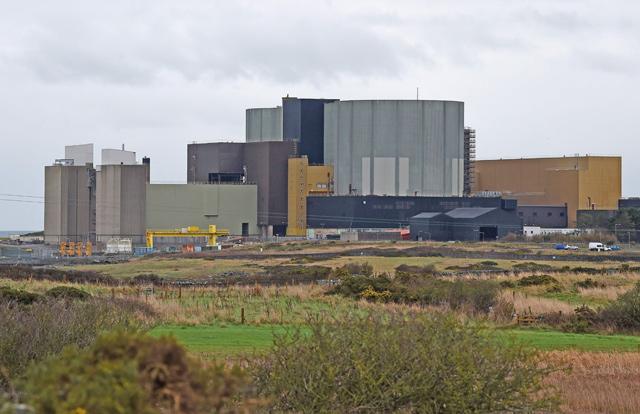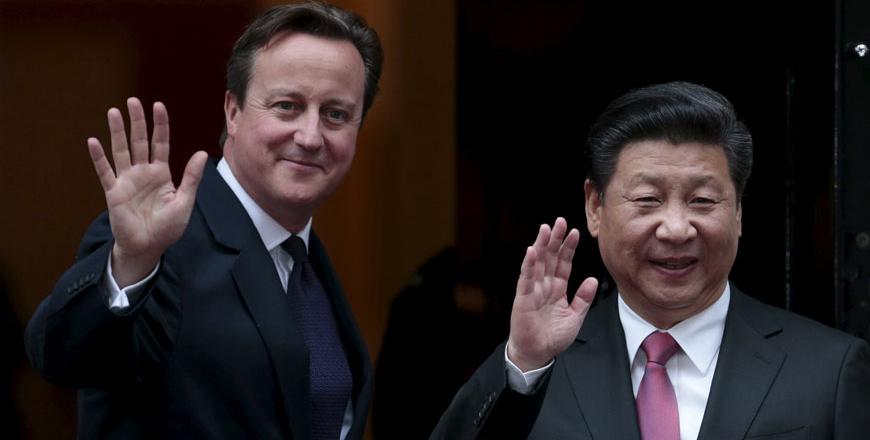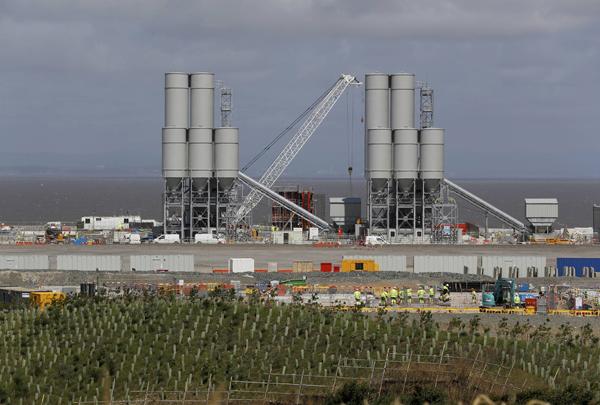You are here
Hitachi scraps plan for UK nuclear plant
By AFP - Sep 16,2020 - Last updated at Sep 16,2020

This photo, on January 18, 2019, shows Wylfa Newydd nuclear power station beyond a farmer’s field in Anglesey in northwest Wales (AFP file photo)
LONDON — Japan’s Hitachi on Wednesday scrapped its multi-billion-pound nuclear plant project in Wales in face of the deteriorating investment environment, in a blow to Britain’s atomic energy programme.
The project in Anglesey, already suspended for 20 months because of financial difficulties, was cancelled as “the investment environment has become increasingly severe due to the impact of Covid-19”, Hitachi said in a statement.
The company said it would consult with the UK government and others regarding the fate of its licences and the Wylfa Newydd site that would have housed two reactors.
“We recognise that this will be very disappointing news for the people of North Wales,” the British government said in a statement.
It asserted, however, that “nuclear power will play a key role in the UK’s future energy mix” as the country transitions “to a low-carbon economy”.
The cost of building the Anglesey plant had been estimated at up to £20 billion ($25.4 billion, 21.4 billion euros).
Its targeted production capacity was nearly three gigawatts — enough to supply around six per cent of Britain’s electricity needs.
As recently as last month, Hitachi’s Horizon Nuclear subsidiary had said it was still committed to the project.
Hitachi had been waiting for the British government’s latest energy strategy, which could potentially include new financing models for the nuclear industry.
‘Urgent need
for progress’
Tom Greatrex, chief executive of Britain’s Nuclear Industry Association, said Hitachi’s decision “underscores the urgent need for progress on new nuclear projects in the UK if net zero carbon emissions is to become a reality”.
The government “can secure these economic and environmental opportunities for future generations by setting out a clear pathway for new nuclear power in forthcoming policy announcements”, he said in a statement.
Britain’s nuclear power plants built in the last century have either closed or are coming to the end of their lifespan.
But the country wants to maintain the 20 per cent of electricity it generates from nuclear power to help meet its pledge to reduce carbon emissions to net zero by 2050 and tackle climate change.
The Hinkley Point scheme in southwest England, the only nuclear project under construction, is due to be completed in 2025.
However, there is mounting concern at Chinese involvement in the project and further planned British nuclear plants amid strained diplomatic ties between London and Beijing.
China General Nuclear Power (CGN) is working alongside France’s EDF in the construction of Hinkley Point, while the pair are also awaiting formal approval for a new plant at Sizewell on the Suffolk coast in eastern England.
In both cases, CGN is the minority partner.
But in another project, the Bradwell nuclear reactor in southeastern England, it is CGN that will hold the majority stake, pending UK government approval of the project.
Strained relations
Diplomatic relations between London and Beijing are fraught after China introduced a controversial security law in former British colony Hong Kong.
In addition, Britain recently ordered the phased removal of equipment belonging to Chinese mobile giant Huawei from its 5G network amid alleged security concerns.
“If CGN is blocked from Bradwell, they might walk out on Hinkley leaving a huge funding gap,” Steve Thomas, a professor of energy policy at London’s University of Greenwich, told AFP.
He described Hitachi’s decision as a “blow” to the UK government.
Justin Bowden, a senior official at British energy union GMB, said having foreign companies and governments to fund the UK’s future energy needs was a “fanciful experiment”.
“This utterly predictable announcement from Hitachi is the outcome of successive [UK] government failures to act decisively around new nuclear, and in particular how it is financed,” Bowden said.
The move also dents Japan’s attempts to expand its nuclear businesses overseas after the Fukushima catastrophe effectively halted demand for new reactors in its home market.
In 2018, Toshiba pulled the plug on a nuclear power plant in northwest England.
Related Articles
LONDON — China vowed Wednesday to take a one-third stake in Britain's first nuclear power plant in decades in a project led by French energy
LONDON — The head of EDF Energy has urged the British government to approve the Hinkley Point C nuclear power project, an explicit appeal by
PARIS — French electricity group EDF on Wednesday said completion of a new nuclear power plant in England would be delayed by six months and

















